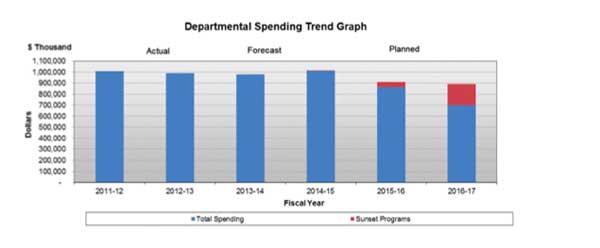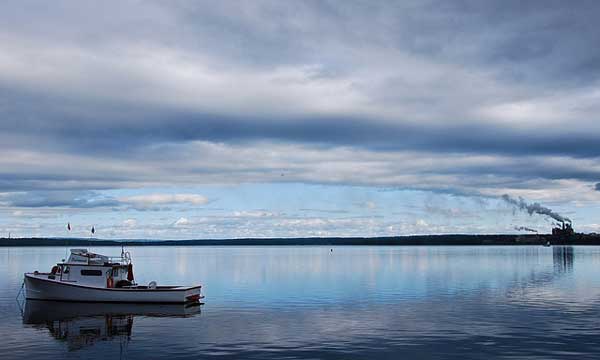The Harper government's plan for Environment Canada, the department tasked with coordinating the country's environmental policies and programs, involves millions of dollars in cuts and hundreds of job losses over the next three years.
The cuts are outlined in a newly-released 2014/15 report on plans and priorities for the department, along with government rhetoric that promises "a clean, safe and sustainable environment while supporting economic prosperity."
Budget cuts will affect the government's three top priority areas for Environment Canada, including the conservation and restoration of landscapes, water and wildlife; information on changing weather patterns and minimizing threats from pollution.
For priority one, Environment Minister Leona Aglukkaq promises in the report's introduction "to protect and conserve wildlife and habitat" by unveiling "a new National Conservation Plan to further increase protected areas, focusing on stronger marine and coastal conservation."
Yet the department will cut funds for wildlife and water programs by 19.2 per cent between now and 2016/17, including a 35 per cent reduction to biodiversity programs, and nearly 10 per cent reductions for water programs, ecosystem sustainability and enforcement.
Money for water protection, for example, will decline to $88 million from $108 million.
Programs related to ensuring natural landscapes provide essential water quality, air quality and carbon filtering services for Canadians will suffer major subtractions: to $63 million a year from $92 million a year by 2017.
Many of the decreases in funding are due to something called "sunsetting," or the death of temporary or time sensitive programs that the government chooses not to renew or extend. However, funding decisions could be reversed or changed by government in future, the report indicates.
Rough weather ahead
According to Aglukkaq, the government will support priority two so that Environment Canada "can deliver high quality weather services" as well as "expand and improve our severe weather warning system."
Yet Environment Canada's weather services will be cut by 17.6 per cent between now and 2016/17. Funding for timely weather forecasts and warnings, for example, will drop to $143 million from $166 million by 2017.
Extreme weather in Canada set a record $3 billion in costs last year. For the last five years in a row, extreme weather related to destabilizing climate change has racked up nearly $1 billion in damages.
The budget for forecasts of the sea state, ice conditions and weather will also decline to $8 million from $12 million.
Minister Aglukkaq also promises that Environment Canada will develop and implement world-class regulations on pollutants, including carbon emissions, as well as "improve industry requirements for prevention, preparation, response and recovery efforts" on hazardous substances.
This will be undertaken despite 42.2 per cent cuts to pollution management and mitigation programs between now and 2016/17.

Funding for programs to "reduce threats to health and the environment posed by pollution and waste from human activities" will fall from $76 million to $44 million.
The Conference Board of Canada, an independent research agency, gives the nation a "D" for its performance on municipal waste management, carbon emissions and the release of volatile organic compounds into the atmosphere.
According to the board, "Canada generated 777 kilograms per capita of municipal waste -- well above the 17-country average of 578 kilograms per capita and twice as much as Japan, the top-performing country," in 2008.
Climate cuts
The minister also promises to support climate change mitigation efforts and "to advance our sector-by-sector regulatory approach to reducing greenhouse gas (GHG) emissions." That approach still does not include the oil sands, which now accounts for 10 per cent of the nation's carbon pollution.
The minister plans to improve the nation's much criticized climate change record (among the worst in the industrial world) with 69.4 per cent cuts to climate change programs between now and 2016/17.
Funding for climate change and clean air programs will fall to $55 million from $118 million, while the enforcement budget drops to $29 million from $41 million by 2017.
Bill Donahue, an Edmonton-based water specialist and critic of rapid bitumen development, found the document's rhetorical goals at odds with its financial math.
"It is just stunning to see the degree to which they are reducing federal scientific infrastructure and the capacity to measure and monitor the environmental problems we are dealing with," said Donahue, who alerted The Tyee about the budget document via email.
Overall, budget cuts to Environment Canada between now and 2017 will total 28.6 per cent. ![]()
Read more: Environment

















Tyee Commenting Guidelines
Comments that violate guidelines risk being deleted, and violations may result in a temporary or permanent user ban. Maintain the spirit of good conversation to stay in the discussion.
*Please note The Tyee is not a forum for spreading misinformation about COVID-19, denying its existence or minimizing its risk to public health.
Do:
Do not: